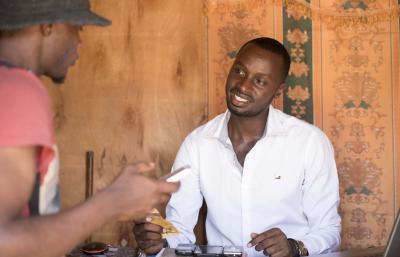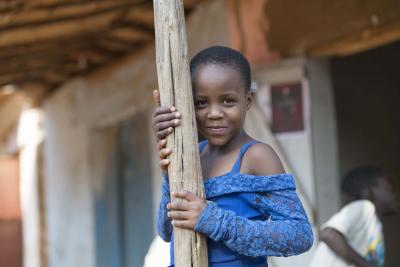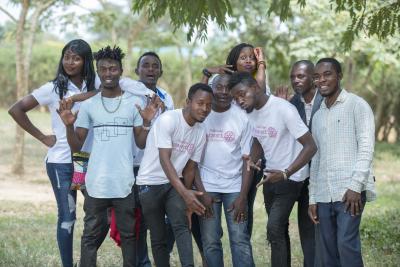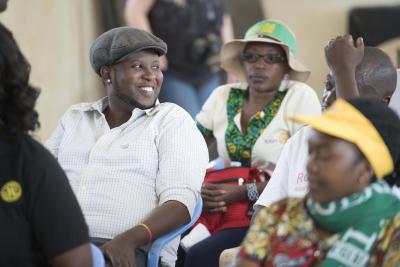After fleeing conflict in their own countries, a group of young Rotaractors is healing wounds and bringing cultures together in a Ugandan refugee settlement
It’s Monday morning in one of Uganda’s largest refugee settlements, Nakivale, and the line at Paul Mushaho’s shop is out of the door.
Mushaho has lived in Nakivale since 2016, when he fled violence in his native Democratic Republic of Congo. After receiving death threats, he crossed into Uganda and joined a friend in the 184-square-kilometer settlement that serves as home to 89,000 people.
The soft-spoken 26-year-old, who has a university degree in information technology, runs a money transfer service out of a wooden storefront that doubles as his home.
Business is booming because he offers his clients – other refugees from Congo, Burundi, Somalia, Ethiopia, Eritrea, Rwanda, and South Sudan – the ability to receive money via mobile phone from family and friends outside Uganda.
He also exchanges currency, and his shop is so popular that he often runs out of cash. On this day, he’s waiting for a friend to return with more money from the nearest bank, two hours away in the town of Mbarara.
Sitting behind a wooden desk, armed with his transactions ledger and seven cell phones, Mushaho grows anxious. He’s not worried about missing out on commission – he’s worried about leaving his clients without any money.
“I don’t like making my customers wait,” he says, looking out onto the lively street of tin-roofed stores, women selling tomatoes and charcoal, a butcher shop displaying a leg of beef, and young men loitering on motorcycles. “There’s nobody else around who they can go to.”
As a young entrepreneur who is intent on improving the lives of others in his community, Mushaho is in many ways the quintessential member of Rotaract, the Rotary-sponsored organization for leaders ages 18 to 30.
Yet his story and that of his club are far from ordinary. Established in late 2016, and officially inaugurated last July, the Rotaract Club of Nakivale may be the first Rotaract club based inside a refugee settlement or camp.
Its founding, and the role it has played in the lives of its members and their fellow Nakivale residents, is a tale of young people who’ve refused to let conflict stifle their dreams; of a country that sees the humanity in all the refugees who cross its borders; and of a spirit of service that endures, even among those who’ve experienced unspeakable tragedy.
A place where refugees are welcome
If Nakivale doesn’t sound like a typical refugee camp, that’s because it isn’t one.
Covering 184 square kilometers and three distinct market centers, Nakivale feels like anywhere else in rural southwestern Uganda, an undulating land of banana trees, termite mounds, and herds of longhorn cattle.
Nakivale blends in with its surroundings in part because it’s been here since the 1950s, when it was established to accommodate an influx of refugees from Rwanda during a flare-up of pre-independence violence there.
Over the years, its population has ebbed and flowed as it accommodated those seeking refuge from a variety of regional conflicts, including civil war in South Sudan, violent state collapse in Somalia, and rebellions and armed militias that continue to terrorize eastern Congo, the area that accounts for the majority of Nakivale’s current residents.
Many have been here for a year or two, others for decades, but most consider Nakivale home.
Unlike other governments in the region, Ugandan authorities grant new arrivals plots of land for farming, as well as materials to erect a basic house, so they can move toward self-reliance. Refugees also have access to free primary education for their children and permission to work so they can contribute to the economy.
Uganda hosts more than 1.5 million refugees within its borders and allows all registered refugees to move about at will. If they can do business in cities or towns, the logic goes, there’s no reason they should be trapped elsewhere.
“They’re going about their lives just like you and me,” says Bernad Ojwang, Uganda country director for the American Refugee Committee (ARC), which works closely with the Rotaract club in Nakivale.
Although an abundance of arable land allows for the nation’s liberal refugee policy, he explains, the system also reflects a high-level belief that refugees can be assets rather than liabilities.
“Uganda has realized that the sooner a country looks at refugees not as a burden but as an opportunity, it changes a lot of things,” he says.
A change maker’s idea
This mindset — of refugees as catalysts for change — ultimately led to the Rotaract club’s founding.
Mushaho learned about Rotaract after entering a competition in 2016 organized by the American Refugee Committee (ARC) for the young people of Nakivale.
The competition, co-sponsored by Uganda’s office of the prime minister, challenged young residents in the settlement to propose business plans or innovations that could improve lives.
Out of nearly 850 entries, Mushaho’s proposal – a beekeeping business that would sell honey – was among 13 winners. They each would receive a small amount of seed money and present their ideas to a wider audience in Kampala, the nation’s capital.
More than 60 Rotarians attended the Kampala event in October 2016, including Angela Eifert, a member of the Rotary Club of Roseville, Minnesota, USA, and an ARC engagement officer, and then Rotary president-elect Sam F. Owori.
Eifert, who first visited Nakivale in 2014, had previously proposed creating an Interact club for 12- to 18-year-olds to help engage its large population of young people. After the event, she mentioned her idea to Owori, who embraced it with one modification: He believed the 13 winners could become leaders in their community, so he proposed a Rotaract club.
“He told me, ‘I was once a Rotaractor,’” Eifert says. “When he saw these young people on stage, he felt they were ideal Rotaractors. He loved their ideas. He saw they had talent and potential, and thought we should be getting behind them.”
Leaders from the Rotary Club of Kiwatule in Kampala and Eifert’s Minnesota club agreed to work together to get the club started and support its growth.
The duo then approached Mushaho about serving as the new club’s president. Of the 13 winners, he’d stood out to them. Humble and charismatic, he also spoke fluent English, had helped the other winners communicate their ideas, and appeared eager to assist the wider Nakivale community. Mushaho and another winner, Jean de Dieu Uwizeye, hosted the Nakivale Rotaract club’s first official meeting in late 2016.
“He was really into it,” says Eifert, who began texting regularly with Mushaho. “He was learning everything he could about Rotary. I think it gave him a great deal of reward and purpose.”
Bettering the settlement
For all of Nakivale’s advantages over more traditional refugee camps, daily life remains a struggle for many.
Families are encouraged to farm the land they’re given, but many rely for months, or even years, on UN food assistance. Rations have decreased recently because of a shortage of global funding.
Barious Babu, a 27-year-old Rotaractor from eastern Congo helps young people navigate the daily struggles of refugee life and provides entertainment and dancing with performances by his All Refugees Can Band.
Children in the settlement have access to free primary education, but few families can afford the fees for secondary school – a situation that contributes to high levels of youth idleness, early marriage, alcohol abuse, and domestic and gender-based violence. Even simple boredom, particularly among a population that’s lived through conflict, can be crippling.
Mushaho says he often sees young people loitering around his shop. “They sit for hours, just thinking, and many of them are traumatized. Others just sleep from morning until night.”
The Rotaract club’s first project, launched in 2017, was designed to help Nakivale’s new arrivals, many of whom had endured harrowing journeys to escape violence.
About 30 new families arrive every day. They sleep in rows of tents, which are periodically overrun with bedbugs and cockroaches. After hearing reports of an infestation, the Rotaractors pooled their modest savings and, with assistance from ARC, purchased chemicals and sprayers to fumigate the area. Additional projects quickly followed.

Nakivale Rotaractors fund most of their projects with their own money. Martin Rubondo, left, and Jean Lwaboshi spend their mornings making bricks, which they sell to raise money to fund music lessons for refugees. Jean and Patrick Sabag, below, practice.

Over the past year, club members have visited the elderly, orphans, and people living with albinism, who face cultural stigmas in the region. Often the Rotaractors bring highly coveted items, such as sugar and soap.
To promote girls’ empowerment, the club also has co-sponsored a jump-rope contest for girls that featured cash prizes. To promote interaction among refugees of different nationalities, they organized a soccer tournament with eight teams from across the settlement.
The Roseville club provided support to both projects, donating soccer balls and hygiene products for the Rotaractors to distribute.
Much of the Nakivale club’s community outreach, however, is self-funded. Members have earned money by raising and selling chickens, and even participated in a 5K race, held in conjunction with World Refugee Day in June 2017, which brought in online donations.
“We don’t want to have to call someone every time, asking for support,” says Uwizeye, a computer scientist who fled his native Burundi in 2015 to avoid being forced into a youth militia. “It’s better to show someone I’ve raised some money on my own – and then maybe ask them, ‘Can you top up?’”
Several Rotaract members have been mentoring other young people in the camp. Alex Ishingwa trains fellow refugees in masonry and helps them bid for local contracts. Byamana Bahati, a dressmaker, trains apprentices at her shop, a short walk from Mushaho’s.
One club member, Jean Lwaboshi, a musician with several love ballads posted on YouTube, spends his mornings making bricks with fellow Rotaractor Martin Rubondo. From their earnings, the two have bought guitars and now give performances and lessons to other young people. “It’s a rewarding feeling to support others through music,” Lwaboshi says.
Mushaho keeps an eye out for refugees who could benefit from the club’s assistance. Recently, when one of his customers approached him about starting a farming project, he helped the woman and a group of friends find a plot of land and connected them to ARC, which provided seeds, fertilizers, and watering cans.
“We appreciate so much that others are thinking of us,” says Ange Tutu, one of the project’s beneficiaries, while tending to her new rows of tomato plants.
Forging a Rotary family
In addition to its own projects, the Nakivale club has galvanized Uganda’s Rotarians to help refugees.
The Rotary clubs of Kiwatule and Mbarara, the closest large town to the settlement, advise and assist with projects. The Kiwatule club has sponsored individual Rotaractors to attend training events and other leadership activities across Uganda. Members of both clubs have donated clothes and other necessities that the Rotaractors deliver to Nakivale residents.
Rotary clubs in Uganda are planning to do more, says a member of the Kiwatule club. In October, local Rotary leaders signed a memorandum of understanding with the office of the prime minister to help refugees in other settlements and possibly form additional Rotaract clubs.
Several of Uganda’s Rotary clubs are planning to improve refugees’ access to water, sanitation, hygiene, and basic education.
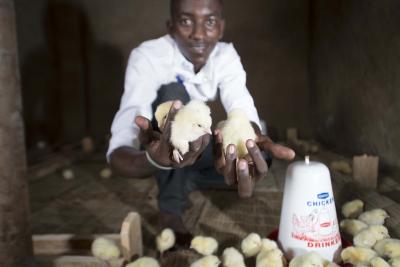
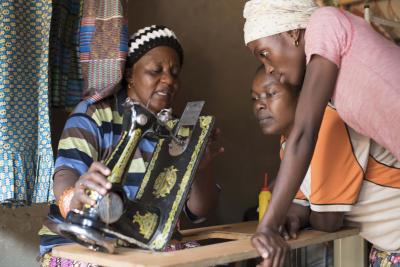
Rotaractors support their own projects by raising chickens to fund projects. Byamana Bahati, a dressmaker, trains apprentices at her shop.
For Xavier Sentamu, the desire to help refugees comes in part from his own experience with conflict. Aside from pockets of the north, most of Uganda has been at peace for the last three decades. Yet the country experienced multiple violent upheavals during the 1970s and 1980s. As a child, Sentamu spent several nights hiding in the bush during the guerrilla war that ultimately brought the current president, Yoweri Museveni, to power.
“I have a bit of a feeling for what they’ve gone through,” says the Kiwatule club member. “Though when you have a person who’s outside their country, who has no idea if or when they’ll go back home, it’s much tougher. The fact that they have gone through that hardship and are willing to offer a little bit of their resources to make others more comfortable is so encouraging.”
After an initial surge in the Nakivale club’s membership, which peaked at more than 40 people, the number of active members has fallen to roughly 20 over the last year. Uwizeye attributes the drop to a misunderstanding: Some thought the Rotaract club was a job opportunity rather than a service group.
The departure of less dedicated members, however, has left the core group of Rotaractors more unified. Many lost relatives to violence or had to leave family behind, and the relationships they have formed in the club are helping them cope.
“All these people are like family,” Mushaho says. “The people in the club become replacements for those people they have lost.”




